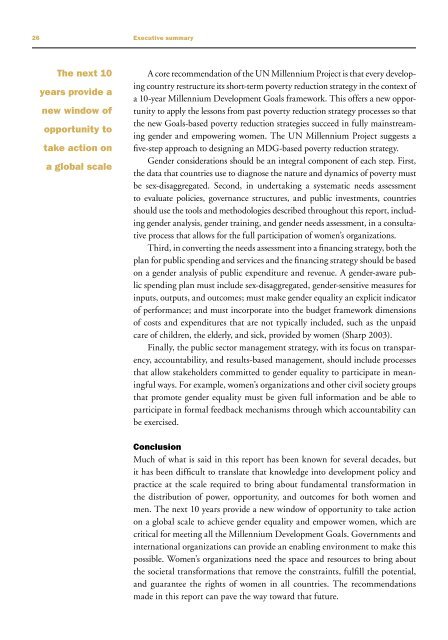Taking action: achieving gender equality and empowering women
Taking action: achieving gender equality and empowering women
Taking action: achieving gender equality and empowering women
You also want an ePaper? Increase the reach of your titles
YUMPU automatically turns print PDFs into web optimized ePapers that Google loves.
26 Executive summary<br />
The next 10<br />
years provide a<br />
new window of<br />
opportunity to<br />
take <strong>action</strong> on<br />
a global scale<br />
A core recommendation of the UN Millennium Project is that every developing<br />
country restructure its short-term poverty reduction strategy in the context of<br />
a 10-year Millennium Development Goals framework. This offers a new opportunity<br />
to apply the lessons from past poverty reduction strategy processes so that<br />
the new Goals-based poverty reduction strategies succeed in fully mainstreaming<br />
<strong>gender</strong> <strong>and</strong> <strong>empowering</strong> <strong>women</strong>. The UN Millennium Project suggests a<br />
five-step approach to designing an MDG-based poverty reduction strategy.<br />
Gender considerations should be an integral component of each step. First,<br />
the data that countries use to diagnose the nature <strong>and</strong> dynamics of poverty must<br />
be sex-disaggregated. Second, in undertaking a systematic needs assessment<br />
to evaluate policies, governance structures, <strong>and</strong> public investments, countries<br />
should use the tools <strong>and</strong> methodologies described throughout this report, including<br />
<strong>gender</strong> analysis, <strong>gender</strong> training, <strong>and</strong> <strong>gender</strong> needs assessment, in a consultative<br />
process that allows for the full participation of <strong>women</strong>’s organizations.<br />
Third, in converting the needs assessment into a financing strategy, both the<br />
plan for public spending <strong>and</strong> services <strong>and</strong> the financing strategy should be based<br />
on a <strong>gender</strong> analysis of public expenditure <strong>and</strong> revenue. A <strong>gender</strong>-aware public<br />
spending plan must include sex-disaggregated, <strong>gender</strong>-sensitive measures for<br />
inputs, outputs, <strong>and</strong> outcomes; must make <strong>gender</strong> <strong>equality</strong> an explicit indicator<br />
of performance; <strong>and</strong> must incorporate into the budget framework dimensions<br />
of costs <strong>and</strong> expenditures that are not typically included, such as the unpaid<br />
care of children, the elderly, <strong>and</strong> sick, provided by <strong>women</strong> (Sharp 2003).<br />
Finally, the public sector management strategy, with its focus on transparency,<br />
accountability, <strong>and</strong> results-based management, should include processes<br />
that allow stakeholders committed to <strong>gender</strong> <strong>equality</strong> to participate in meaningful<br />
ways. For example, <strong>women</strong>’s organizations <strong>and</strong> other civil society groups<br />
that promote <strong>gender</strong> <strong>equality</strong> must be given full information <strong>and</strong> be able to<br />
participate in formal feedback mechanisms through which accountability can<br />
be exercised.<br />
Conclusion<br />
Much of what is said in this report has been known for several decades, but<br />
it has been difficult to translate that knowledge into development policy <strong>and</strong><br />
practice at the scale required to bring about fundamental transformation in<br />
the distribution of power, opportunity, <strong>and</strong> outcomes for both <strong>women</strong> <strong>and</strong><br />
men. The next 10 years provide a new window of opportunity to take <strong>action</strong><br />
on a global scale to achieve <strong>gender</strong> <strong>equality</strong> <strong>and</strong> empower <strong>women</strong>, which are<br />
critical for meeting all the Millennium Development Goals. Governments <strong>and</strong><br />
international organizations can provide an enabling environment to make this<br />
possible. Women’s organizations need the space <strong>and</strong> resources to bring about<br />
the societal transformations that remove the constraints, fulfill the potential,<br />
<strong>and</strong> guarantee the rights of <strong>women</strong> in all countries. The recommendations<br />
made in this report can pave the way toward that future.

















